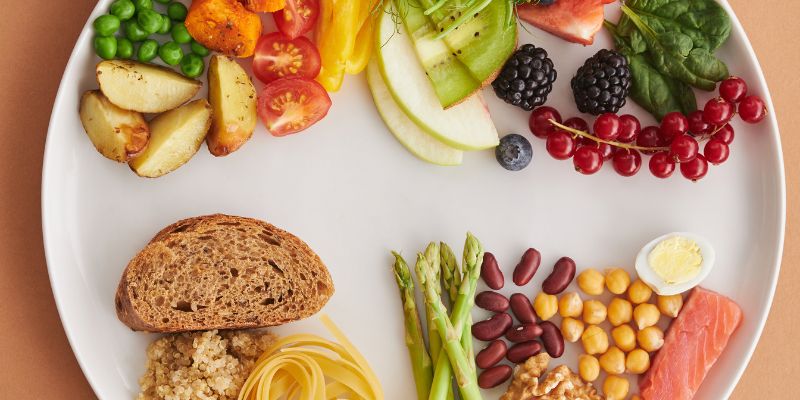A Stress-Reducing Diet Plan Recommended By Experts
Feb 04, 2024 By Madison Evans
The food we consume daily significantly impacts our mental and physical health. Stress is one issue that cannot be denied and needs proper attention. Intake of different food items in our daily lives can play a significant role in the human body's well-being. Multiple factors are involved in creating stressful conditions, and these can lead to absolute destruction. A stressed person is likely to develop diseases like headaches, disruption in the digestive system, obesity, weight loss and severe chronic diseases like diabetes, depression, heart disease, etc. Therefore, it is essential to develop a good eating habit so that it may not become the reason for your stress.
From metabolic and immunological to the digestive system, stress can be very harmful and disrupt the body's overall functioning.
How Diet And Stress Are Interlinked?
The influence of food on our body functioning is significant and complex at the same time. Nutritious choices can save one from several health concerns, including stressful conditions. Following are some factors that show the strong relationship between healthy dietary intake and minimization of stress.
Maintenance Of Blood-Sugar Levels:
Consumption of essential vitamins, nutrients and minerals in the food intake contributes significantly to a person's overall health. As we all know, an appropriate and healthy diet is essential for reducing stress; it can also aid in adequately functioning the central nervous system.
However, adequate amounts of proteins, fats and carbohydrates can help stabilize the fluctuations in the blood sugar level. Intense imbalance in these levels can lead to a stressed environment inside the body.
Intake Of Foods That Relieve Stress:
Food rich in magnesium, such as nuts, whole grains, and green vegetables, are the primary source of stress mitigation. Likewise, Omega-3, known for its excellent anti-inflammatory properties, can reduce stress levels to a great extent if added to the diet. Some foods rich in Omega-3 are fish, walnuts, flaxseed, etc. Moreover, consuming fresh vegetables and fruits is the best option to improve well-being.
Adequate Water Intake:
Consuming enough water daily reduces stress levels. Dehydration is the worst stage a person goes through, along with other problems like irritability and tiredness, if water is not consumed correctly.

Stress Relieving Food Items
There is a diverse range of food that helps in providing a stress-free environment.
Dark Chocolate:
It is rich in antioxidants and reduces stress levels. Dark Chocolate, although it is not a very healthy option to reduce your stress level, can help to provide instant relief from anxiety.it is high in calories, so it is recommended to have a little piece of it when needed.
Olive Oil:
Olive oil has always remained a healthier and safest option among other cooking oils. Using olive oil over others can reduce stress and also improve health.
Bananas:
The yellow fruit is a rich source of Potassium and Magnesium and can relieve stress. It also contains Vitamin B, which is excellent for properly functioning the central nervous system.
Nuts:
Unsalted nuts such as almonds, walnuts and pistachios are considered an excellent and balanced dietary source to limit stress.
Avocados:
Another option is the intake of fruits like avocadoes in your diet due to the enrichment of Vitamin C and B6. These two vitamins are considered excellent for reducing stress conditions. This fruit, however, also helps lower blood pressure.
Leafy Green Vegetables:
Magnesium-rich green leafy vegetables like spinach can also be taken when facing anxiety.
Whole Grain:
Whole grain products like brown rice, whole grain flour, whole wheat pasta, etc., are healthier, sustainable options to add to the diet. These organic products can also help in reducing stress levels.
Vitamin-C- C enriched foods:
Fruits like oranges, strawberries, grapefruit, etc., are rich in Vitamin-C, a significant element in decreasing stress.

Food Items Are To Be Avoided During Stressful Conditions.
Caffeine:
The primary sources of caffeine are coffee and different energy drinks. Safe intake is neither harmful nor can cause an elevation in stress levels, but high and continuous intake is not recommended. Expressly, during sleep hours, caffeine-containing liquid consumption is prohibited strongly.
Food High In Sodium:
Foods that are rich in sodium, like processed or canned food, soups, sandwiches, etc, are not only significant sources of stress and anxiety but also contribute significantly to the chronic level of hypertension.
Dairy Products:
Depending upon the physiology of the human body, some individuals are highly allergic to dairy products. Hence, it is however advisable to restrict the usage of such items that only elevate the stress and anxiety levels instead of reducing them.
Fried Food Items:
Fried food items, in any case, do not provide any benefit to human health; instead, they may lead to disturbance in the digestive system and ultimately cause stress.
Spicy And Processed Food:
Adding different preservatives in the canned food is never considered a healthy and safe option for human health. Likewise, highly spicy foods bring digestive disruption and develop stressful conditions for an individual.
Conclusion
It is to be remembered clearly that diet intake and stress variations vary among individuals. The food mentioned above can have different impacts depending on the metabolism and functioning of the human body. People with different physiology are advised to consult their physician before taking any complex food item in their diet. Mindful diet intake, along with a healthier lifestyle, can bring peace and comfort and help in coping with stress and anxiety. It is essential to have a keen knowledge of your diet intake. Regular exercise and proper sleep can further help in maintaining a healthier lifestyle. Consulting a nutritionist for a good diet plan according to your metabolism is also highly appreciated and recommended.







